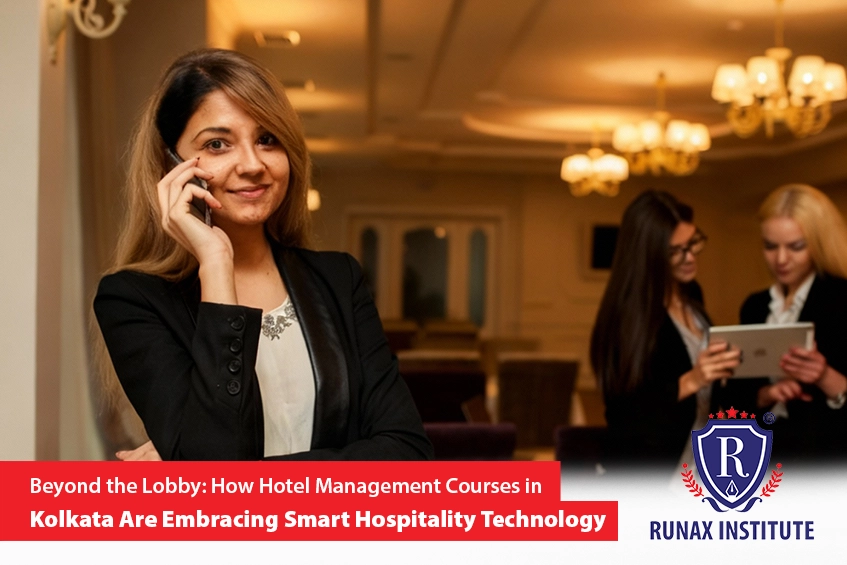Introduction
Picture this: you step into a hotel lobby and the doorman greets you by name, the lights dim to your preference, the AC adjusts without a button press, and your room key is that little chip in your phone—no plastic card required. Exciting? Absolutely.
But here’s the catch: if you’re heading into hospitality training and your course still teaches only housekeeping, room service and breakfast buffets, you’re already behind. The hospitality industry is transforming with the integration of smart hospitality management, automation systems, and digital transformation at its core. Without understanding this shift, you risk becoming the manager who knows how to fold napkins but not how to fold in data.
Good news: The right hotel management institute in Kolkata is gaining momentum. These programmes now blend classic service skills with modules on IoT in hotels, AI in hospitality education, cloud-based hospitality platforms and more—arming you to lead, not follow.
Stick around if you want to see how the next-gen hotel manager will operate and how you can become one.
The Digital Turn in Kolkata’s Hotel Management Education
Hospitality in India is no longer just about linen and lobbies—it’s about analytics, automation and guest-centric tech. In Kolkata, most institutes of Hotel Management in Kolkata-type programs recognise this and have evolved. They now teach students not only how to welcome guests but also how to integrate hotel management technology into operations. Think smart check-ins, robotic vacuuming for housekeeping, and AI-driven guest marketing.
Students learn that a room’s thermostat might talk to a PMS, that the front desk may be virtual, and that service staff may be supported by data dashboards. Traditional service is still taught—because you need empathy and elegance—but it’s paired with tech fluency. So graduates of these courses walk in knowing how to manage both a handwritten welcome card and an algorithm predicting guest preferences. They’re ready for smart operations, not yesterday’s routines.
The Smart Hospitality Revolution: Understanding the Global Shift
Around the globe, hospitality has entered a phase where devices talk to devices, and hotels talk to guests via apps. Smart hotel operations are the new benchmark. In-room voice assistants, smart lighting, app-controlled doors and concierge chatbots represent the new welcome. In India, major chains are investing in IoT in hotels and hospitality data analytics to remain competitive.
For a student in Kolkata, this means your hospitality education needs to reflect this wave. The good news: the hotel management course in Kolkata now includes modules on virtual hotel simulations, cloud-based hospitality platforms, and automation integration. You’re no longer trained only to run the front office—you’re trained to run a smart hotel. By equipping you with these perspectives, the courses prepare you for both global and domestic hospitality trends.
Hotel Management Curriculum 2.0: Integrating Digital Modules into Education
What’s actually being taught? Quite a bit. Modern hospitality programmes now include modules on property management software (PMS), guest experience analytics, digital housekeeping tools, and even programming robots for service. In Kolkata, curricula focused on service etiquette are now packed with tech-management units.
Students engage with simulation labs that mimic smart bookings, housekeeper allocation by data points and cloud-server management of guest profiles. They use real-world tools like a PMS that integrates with IoT sensors. This blend of classic and cutting-edge means you learn how to greet guests and how to read dashboards. The outcome: a graduate fluent in manual and digital operations, ready to manage a hotel with one hand on the guest book and the other on a tablet.
IoT and Automation: Redefining Guest Experiences in Hospitality Training
In-room gadgets, automated check-in, smart sensors—these aren’t just buzzwords; they’re live practice. In Kolkata’s programs, students learn how IoT in hotels makes guest rooms smarter and how smart thermostats, occupancy sensors and digital door locks enhance comfort and reduce waste.
They also train in hospitality automation systems where a guest’s preference for a soft light and mild AC gets triggered automatically. Students manage these systems in labs, linking devices, ensuring security, and balancing efficiency with guest delight. The idea isn’t to replace human service but to amplify it. By operating these systems, future hoteliers learn how to make a guest feel special while keeping costs and carbon footprints down.
Artificial Intelligence in Guest Management: From Chatbots to Predictive Service
AI isn’t just a fancy term—it’s transforming hospitality service. In Kolkata’s hotel-management courses, students engage with tools that automate guest requests, segment guests based on behaviour, and predict preferences. They study AI in hospitality education, where chatbots handle basic queries and analytics flag when a guest might prefer breakfast in bed instead of the buffet.
The modules teach how to interpret data from guest stays, how to feed that into service design and how to ensure the AI works without losing the human touch. Graduates become professionals who can manage a chatbot one moment and personally greet a VIP the next. They stand out in an industry that still values warmth but expects efficiency and insight.
Virtual Reality (VR) and Augmented Reality (AR) in Training Simulations
Imagine walking a student through a 3D model of a hotel lobby, managing a service crisis virtually, then switching to an AR interface to optimise guest flow in a banquet. In Kolkata’s hospitality training, modules on hospitality innovation training bring virtual hotel simulations into reality.
Students work with VR headsets to simulate housekeeping rush and guest check-in via mobile and AI concierge interactions. They analyse errors, practise response times, and train in environments that mirror real-life challenges but without real-world risk. AR overlays let them visualise room layouts, guest movement and service optimisation in real time. This immersive training builds confidence, sharpens decision-making and makes tech feel intuitive—not intimidating.
Data Analytics and Business Intelligence in Hospitality Operations
Managing a hotel today is partly about towels and partly about metrics. In Kolkata’s leading courses, students dig into hospitality data analytics and business intelligence. They learn to analyse occupancy rates, revenue per available room (RevPAR), guest lifetime value, and service-uptake metrics.
The modules teach how to use dashboards to forecast demand, adjust pricing dynamically, segment guest types and personalise offers. With digital transformation in hospitality in full swing, students learn that great hotel service must also generate insights. By mastering those tools, they become professionals capable of improving profitability, guest satisfaction and operational efficiency—all at once.
Sustainability Meets Technology: The Smart Green Hotel Concept
Technology isn’t just about flash—it’s also about green. Modern hotel education emphasises sustainable hotel technology, teaching how automation reduces energy use, IoT lowers waste, and data helps drive eco-friendly operations. For example, smart sensors turn off lights in empty rooms and cloud monitoring tracks water usage.
The curriculum connects this to hospitality: luxury no longer means massive waste—it means intelligent resource use. Students learn how a “smart room” can be luxurious, efficient and environmentally conscious. They’re trained for a future where hotels proudly display both “five-star” and “eco-smart” badges. The graduate who knows how to manage robotic cleaning, smart systems and guest pleasure simultaneously becomes game-ready.
Industry Collaborations: Learning Directly from Smart Hospitality Leaders
Theory is necessary, but contact with live systems is crucial. In Kolkata, hotel management courses partner with technology providers, hoteliers and hospitality chains to give students hands-on exposure to hospitality innovation training. Internships may involve working with property management software (PMS), analysing guest analytics, or implementing contactless guest services. Real projects help bridge academic learning with practical skills.
These collaborations ensure that students graduate with experience in smart hotel operations and have their resumes enriched with real tech projects. That’s a huge advantage in India’s dynamic hospitality industry, where hotels seek staff who can plug into new tech frameworks without a steep learning curve.
The Future of Smart Hospitality Careers: Opportunities for Tech-Savvy Hoteliers
So what does all this tech training mean for your career? Plenty. Graduates from hotel management courses in Kolkata who know smart hospitality technology integration, cloud-based hospitality platforms, and guest analytics are high-value assets. Emerging roles include Digital Guest Experience Manager, Smart Hotel Operations Leader, Hospitality Technologist and Automation Coordinator.
In India and internationally, hotels are looking for professionals who understand both service and software. The opportunity lies at the intersection of luxury hospitality and high-tech operations. Training that blends both equips you for the next decade—not just the next job. If you’re ready to embrace the future, the hospitality world is your playground and your code editor.
Conclusion
If you walked into any random hotel today and saw a robot delivering towels, a guest unlocking a room with their phone, and an algorithm scheduling housekeeping based on occupancy, you’d realise how far hospitality has come. The hotel management courses in Kolkata that integrate modules on smart hospitality management, IoT in hotels, AI in hospitality education, cloud-based hospitality platforms, and hospitality data analytics are training you to thrive—not just survive.
By combining traditional service skills with technological fluency, these programmes prepare future hoteliers for a world where guest delight, operational efficiency and smart systems go hand in hand. Your career need not be about managing check-in lines—it can be about designing the guest journey in a smart hotel environment, guiding innovation and delighting guests in ways we’re just beginning to imagine.
Technology has entered hospitality—and the lobby is just the beginning.
Frequently Asked Questions
1. What makes hotel management courses in Kolkata unique right now?
They include modules on hotel management technology integration, IoT in hotels, cloud-based hospitality platforms, and digital transformation in hospitality—not just the basics of service.
2. Do students really get hands-on training with smart systems?
Yes. Many programmes include virtual hotel simulations, real-world labs, guest analytics tools and training in hospitality automation systems to ensure preparedness.
3. Why is data analytics important in hospitality education?
Because modern hotels base decisions on data—occupancy forecasts, guest behaviour, and service uptake. Hospitality data analytics converts raw numbers into better guest experiences and higher revenue.
4. Can sustainability be part of hotel tech training?
Absolutely. Training covers sustainable hotel technology, energy-efficient smart rooms, waste-reduction automation and green-hotel operations.
5. What kind of career paths are open after such tech-savvy hospitality courses?
Graduates are ready for roles like Smart Hotel Operations Leader, Hospitality Technologist, Digital Guest Experience Manager and Automation Coordinator. Their mix of service and tech skills makes them highly employable.






